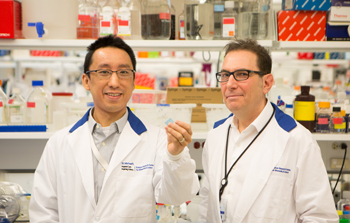St. Michael’s scientists ‘mind’ their own business

By Geoff Koehler

Dr. Darren Yuen holds a slide with samples of scarred kidney tissue. He and Dr. Richard Gilbert are two-thirds of the co-founders of a new company called Fibrocor. (Photo by Katie Cooper)
Dr. Richard Gilbert, head of the Division of Endocrinology and Metabolism for St. Michael’s Hospital, and Dr. Darren Yuen, a nephrologist with the hospital, work together on cases where diabetes and kidney disease intersect. Also scientists with the Keenan Research Centre for Biomedical Science, they both have labs on the 5th Floor of the centre.
On top of stethoscopes and microscopes, the pair has added business scope to their frequent discussions—with the launch of a company called Fibrocor.
Drs. Gilbert and Yuen are two of the three scientific co-founders of Fibrocor, who will work to identify targets and develop therapies to prevent, slow and ultimately reverse organ scarring.
“Scarring, or fibrosis, can help people in the short-term—such as healing after a cut or sealing off an infection so that it does not spread—but when an injury is chronic, such as with diabetes, the amount of scar tissue formed can cause organ malfunction,” said Dr. Gilbert, who also holds the Canada Research Chair in Diabetes Complications.
The researchers and fellow co-founder Dr. Jeff Wrana, a professor in the University of Toronto’s Department of Molecular Genetics and senior investigator at Mount Sinai Hospital’s Lunenfeld-Tanenbaum Research Institute, will test biopsy samples of scarred human tissue. They will measure which genes the body activates when scarring begins.
“Once we know what pathways are involved in activating the body’s scarring response, we’re well on our way to understanding how to block it,” said Dr. Yuen. “And because we’ll identify these pathways using human tissue samples, we think they’ll have a much better chance of being effective in future clinical trials.”
Although scarring underlies the development of liver failure, heart failure and certain type of lung disease, the company’s initial focus will be on kidney disease—reflecting Dr. Gilbert’s and Dr. Yuen’s clinical backgrounds and the tremendous unmet need.
By 2018, Fibrocor expects to have developed a new anti-scarring drug that will be ready for testing, not only in kidney disease but also in other diseases that involve fibrosis, the doctors said. The world-class academic team is complemented by management and business development from MaRS Innovation and drug discovery and development services from Evotec AG.
“Because drug development is incredibly expensive and most granting agencies don’t fund this sort of activity, forming the company was a necessity,” said Dr. Yuen. “With Fibrocor, we’ll be part of the developmental strategy, taking our knowledge from the clinic, to the lab, to the boardroom and, hopefully, all the way back to the bedside.”
About St. Michael’s Hospital
St. Michael’s Hospital provides compassionate care to all who enter its doors. The hospital also provides outstanding medical education to future health care professionals in 27 academic disciplines. Critical care and trauma, heart disease, neurosurgery, diabetes, cancer care, care of the homeless and global health are among the hospital’s recognized areas of expertise. Through the Keenan Research Centre and the Li Ka Shing International Healthcare Education Centre, which make up the Li Ka Shing Knowledge Institute, research and education at St. Michael’s Hospital are recognized and make an impact around the world. Founded in 1892, the hospital is fully affiliated with the University of Toronto.
